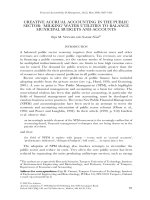In the pub
Bạn đang xem bản rút gọn của tài liệu. Xem và tải ngay bản đầy đủ của tài liệu tại đây (54.93 KB, 12 trang )
Pubs are an important institution in the UK. They are places where we go to relax, meet our
friends, and of course drink. Many pubs also serve food. In many smaller towns and villages
they are a central feature of the community and its activities.
Test (and develop) your knowledge of pubs with this quiz.
42
In the pub
1. Pub is a shortened form of which two words?
2. Pubs must be licensed. What does this mean?
3. Who is the landlord or landlady of a pub?
4. Some pubs have the words free house on a sign outside. What does this mean?
5. How old must you be to buy an alcoholic drink in a pub?
6. Are children under 16 allowed to go into pubs?
7. Can you smoke in pubs?
8. In a pub, do you sit at your table to wait to be served, or do you go directly to the bar?
9. What are bitter, lager and stout? What is cider? What are spirits?
10. What measurements are bitter, lager, stout and cider sold in?
11. You order a single whisky for yourself and a double brandy for your friend: how much (in millilitres)
is each drink worth in quantity?
12. Can you buy non-alcoholic drinks in a pub?
13. What are you doing if you are buying a round?
14. You are in the pub with a large group of friends, and one of them suggests starting a kitty. What
does he / she want to do?
15. Do you pay for drinks as you buy them, or do you pay for everything you have bought when you
leave the pub?
16. You ask the bar person if you can start a tab. What do you want to do?
17. Once you have bought a drink, is there a time limit within which you have to drink it?
18. Is it normal to tip the people working behind the bar?
19. British people consider it very important to queue (for example, in a shop, at the bus stop, etc). Do
they do this in a pub?
20. You are standing at the bar to buy a drink. The bar is very busy. What should you do to get the bar
person's attention?
21. If you accidentally spill someone's drink, what should you do?
22. Is it considered normal or acceptable in a pub to share a table with people you do not know?
23. Is it considered normal or acceptable to start a conversation with a stranger in a pub?
24. Another (male) customer asks you if you know where the gents are. What does he want?
25. What is pub grub? What are bar snacks?
26. Gastropubs are becoming increasingly popular in the UK. What are they?
27. You are enjoying a drink when the bar person shouts "Last orders!". What does he / she mean?
28. Ten minutes later, he / she shouts "Time please!", and / or rings a bell. What does this mean?
29. By law, at what time do most pubs have to stop serving alcohol?
30. Can you buy alcohol in a pub to take home with you?
31. What are darts, billiards, dominoes and skittles?
32. A bar person tells you that you are barred. What must you do?
33. Can a bar person refuse to serve you a drink without giving you a reason?
34. Binge drinking is becoming a big problem in the UK. What is this?
Test your knowledge with this quiz.
Also see Relationships 2 on the next page.
Relationships 1: Marriage and related issues
43
1. True or false?: A contract between a man and a woman to become husband and wife is called an
engagement.
2. When a couple become engaged, are they legally bound to marry each other?
3. In the UK, what is the minimum age for getting married (a) with your parents' written permission,
and (b) without permission from your parents.
4. Are you allowed to marry your cousin in the UK?
5. Are arranged marriages legal in the UK?
6. Rearrange the letters in bold to make a word meaning husband or wife: pusoes
7. True or false?: If you have a partner, you are assumed to be married.
8. What is the age of consent in the UK?
9. Is homosexuality a crime in the UK?
10. Are same-sex marriages legal in Britain?
11. Are bigamy or polygamy legal in the UK?
12. What do a couple need to obtain before they can be legally married?
13. When a woman marries, must she take her husband's surname?
14. Do couples who marry in a civil ceremony have the same rights and responsibilities as those who get
married in a religious ceremony?
15. Rearrange the letters in bold to make words for the places where a couple can get married:
(a) a registered place of oseligriu hwprsoi (b) a griteysr cfioef (c) premises that have been
approved by the acllo tyutoarih
16. Do unmarried couples who live together have the same legal rights as those who are married?
17. What is the difference between a separation and a divorce?
18. Can a woman in the UK divorce her husband?
19. A couple get married, but very soon afterwards they decide that the marriage has irretrievably
broken down (it is not working, and will not work). How long must they wait before they can get
divorced?
20. A married man wants to have children, but his wife refuses to have any. Can the man divorce his
wife?
21 Is domestic violence a crime in the UK?
22. If a man has sex with his wife against her will, can he be accused of rape?
Test your knowledge with this quiz.
44
Relationships 2: Children and related issues
1. If an unmarried couple have children, who has parental responsibility for them?
(a) The father (b) The mother (c) Both of them
2. How long does parental responsibility last?
(a) Until the child is 16 (b) Until the child is 18 (c) Until the child is 21 (d) Until the parent(s)
decide(s) that the child is old enough to look after him / herself
3. If an unmarried couple have children, who has the legal responsibility to maintain the children
financially?
(a) The father (b) The mother (c) Both of them
4. If a married couple gets divorced, who gets custody of their children?
5. Is a parent allowed to smack his / her child?
6. Does a local authority have the legal right to remove a child from its home if necessary?
7. If a divorced couple have children, one of them may be required to make regular payments to their
ex-husband / ex-wife to help pay for the upbringing of the children. What are these payments
called?
(a) child support (b) child maintenance (c) child benefit (d) child pensions
8. An unmarried couple with two children separate. The father moves away to another town. Is he
legally obliged to make payments to his ex-partner for the upbringing of the children?
9. In England and Wales, the agency responsible for the assessment, review, collection and
enforcement of child payments is called the CSA. What do you think these letters stand for?
10. How old should children be before a CSA ruling no longer applies?
(a) 15 (b) 16 (c) 17 (d) 18
11. A 16-year-old child is told by a hospital that he / she needs an operation. Does the hospital need the
consent of the child's parents before the operation can take place?
12. Can a doctor or nurse provide contraceptive advice and treatment to someone under the age of 16?
13. The parents of a 14-year-old child go away for a short holiday, leaving the child alone in the house.
Are they breaking the law?
14. A couple's 14-year-old child has a morning paper round. He starts this round at 6 o'clock in the
morning. Is this legal?
15. The same couple's 13-year-old daughter has a part-time job cooking breakfasts in a café. She starts
this job at 7 o'clock in the morning, and finishes at 8.30. She then goes to school. Is this legal?
16. A couple own a small shop that sells cigarettes and alcohol. They sometimes let their 15-year-old
daughter serve customers. Is this legal?
17. A man lets his 16-year-old son smoke. Is he breaking the law?
18. A 17-year-old person tells his parents that he wants to learn to drive a car. Their parents tell him that
it is illegal to drive a car if you are under 18. Are they correct?
Exercise 1
:
Chain-stores are groups of shops that belong to the same person or company. These can
be found on nearly all UK high streets (= main / most important shopping streets).
Match the names of some of the most common chain-stores in the box with their
description from numbers 1 – 20.
Exer
cise 2:
Many countries have legislation in place to protect the rights of consumers. In the United
Kingdom they are protected by laws such as the Sale of Goods Act, the Supply of Goods
and Services Act, the Distance Selling Regulations, the Consumer Protection Act and the
Consumer Credit Act.
On the next page you will see a summary of some of the key points from these laws, and
some other information which consumers might find useful. Complete the paragraphs
with words and expressions from the box.
Shopping and consumerism
45
Argos… Barclays… Boots… Cargo… Clarks… Dixons… Hallmark… HMV…
Holland and Barrett… Marks and Spencer… Prêt a Manger… Next… Robert Dyas…
Specsavers… Starbucks… Tesco… The Link… Thomas Cook… Waterstones…
W.H.Smith…
1. …is one of the biggest bookshop chains in the UK.
2. …only sells mobile phones, mobile phone contracts and mobile phone accessories.
3. … mainly sells beauty products, toiletries and medicines.
4. … is a department store that mainly sells clothes, but is also popular for its range of high-quality
food.
5. …specialise in health foods.
6. …is the place to go for greetings cards and small gifts.
7. …sells kitchen, household and garden products and furniture.
8. …is well-known mainly for its men's and women's clothes and clothing accessories.
9. …mainly sells stationery, greetings cards, books, magazines and newspapers.
10. …only sells shoes and shoe-related products.
11. …sells delicious sandwiches and non-alcoholic drinks (usually to take away).
12. …is one of several high street coffee shops.
13. …is a shop that sells electronic equipment, especially music systems, televisions, computers and
cameras.
14. …is one of the UK's best hardware stores.
15. …is the place you should go for glasses and contact lenses.
16. …sells mainly CD's, DVD's and computer games.
17. …is a good place to go to book a trip or holiday, or buy and sell foreign currency.
18. …is one of the biggest supermarket chains in the UK.
19. …is a shop where you order goods from a catalogue, pay for them, and collect them from a counter
in the shop.
20. …is one of the biggest bank chains in the UK.
46
ț
accurate description
ț
as described
ț
claim for compensation
ț
cooling-off period
ț
credit card fraud
ț
credit voucher
ț
defective
ț
delivery arrangements
ț
fit for intended purpose
ț
give a refund
ț
guarantee or warranty
ț
opt out of
ț
poor workmanship
ț
proof of purchase
ț
reasonable care and skill
ț
reasonable charge
ț
receipt
ț
responsibilities and liabilities
ț
satisfactory quality
ț
specified period
ț
unsolicited mail
ț
unsolicited telemarketing
ț
wear and tear
ț
within a reasonable time
ț
written confirmation
1. Providers of goods and services (including credit providers and hire companies) all have
____________ towards the customer which are aimed at protecting the customer and his / her
rights.
2. When you buy goods, they must be of ____________: the condition they are in should match your
expectations based on the price you paid. They should also be '____________' (in other words, they
must match the description made by the provider and / or the manufacturer), and they must be
'____________' (they should do what you expect them to do).
3. All goods must carry a ____________ in case they go wrong or do not meet your expectations.
4. If you need to return goods to a shop or other supplier, you should do so ____________: many
shops and suppliers specify their own limit, usually 28 days, and can refuse to do anything if there is
evidence of unreasonable ____________ (signs that the goods have been used more than is normal
or for a purpose for which they were not designed).
5. If you take goods back to a shop, they are entitled to ask for ____________, such as a
____________, a credit card slip, etc, that shows you actually bought the goods from them.
6. Many shops may refuse (illegally, if the product you have bought is faulty or ____________) to
____________, and instead of returning your money will offer you a ____________ to use in that
shop at a later date.
7. Where certain goods or services are ordered on the Internet, on-line shops should offer their
customers a ____________ after they have ordered them, in case the customer decides to suddenly
cancel their order.
8. On-line (Internet) shops should give the customer an ____________ of the goods being sold, and
clearly state the price, ____________ and options (how and when the customer can expect to
receive their goods, whether there is an extra charge for postage, et(c).
9. On-line shops should also protect customers against ____________, and should allow customers to
____________ receiving further information and ____________, ____________ or unsolicited
emails. They should also send the customer ____________ of their order (often in the form of an
email sent after the order has been placed).
10. If a service is being provided (for example, a mobile phone contract), and there is a ____________
for the contract, this must be clearly stated by the provider.
11. If you buy faulty goods with a credit card, and those goods cost between £100 and £300, you have
an equal ____________ against the seller of the goods and the credit card company.
12. Where a service such as the repair of a car is being provided, it should be done with ____________
(an unsatisfactory standard of work or general ____________ should not be accepted by the
customer) for a ____________ (the customer should not have to pay an excessive amount of money)
and within a reasonable time.









